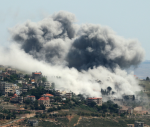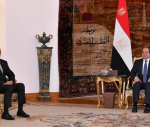You are here
Erdogan’s pragmatism
Jul 05,2016 - Last updated at Jul 05,2016
Turkey’s about-face in its regional and international politics has come as a shock for some, and as proof that President Recep Tayyip Erdogan is capable of embracing a pragmatic approach on challenging issues, for others.
In the past few weeks Ankara has concluded a historic reconciliation agreement with Israel, after six years of bitter enmity in the wake of the Mavi Marmara incident in 2010, followed by a surprising apology by Erdogan to President Vladimir Putin over the downing of a Russian fighter jet in Syria in November.
The apology has led to a thaw in ties between Ankara and Moscow, the beginning of a normalisation process in relations and the resumption of cooperation, especially on terrorism and the Syrian conflict.
So a new chapter in Turkey’s foreign policy has begun more than five years after the eruption of the Syrian conflict, in which Erdogan adopted an extreme position against President Bashar Assad and his regime.
In fact, Turkey’s role in the Syrian crisis remains controversial until today; it has overshadowed its relations with its American and European allies and brought it close to the brink in its confrontation with Moscow, following the latter’s military intervention in Syria last year.
Resumption of diplomatic relations with Israel is the fruit of months of secret negotiations between the two countries, which some see as proof that Turkey’s strongman is taking in a new reading of regional crises and his country’s reaction to them.
On the plus side, while Ankara failed to convince Israel to lift its economic blockade on Gaza, it was able to open a humanitarian sea route, via the Israeli port of Ashdod, to deliver food, medicine and other aids to the stranded strip people.
Erdogan’s supporters will say that this is something that the entire Arab, Muslim and world community failed to do for the forgotten people of Gaza.
Israel will also pay compensation to the families of Turkish activists who were killed in the Gaza Freedom Flotilla incident.
In return, Israel has received commitments that Turkey will not allow anti-Israeli activities to take place on its territory, something that Hamas leadership will find hard to swallow.
There are also economic benefits that Ankara hopes to gain from its Israeli partner.
One can argue that Turkey is now in a position to play a positive role as an intermediary between Palestinians and Israelis, but critics will see this as a departure from Ankara’s full-hearted support of the Palestinian cause.
In relation to Russia, Erdogan’s move was necessitated by the shortcomings of Turkey’s policy on Syria for years.
The role of the so-called Syrian moderate opposition has eroded in the past months, giving way to the more extreme groups on the ground, who are putting up strong resistance against regime forces and their Hizbollah and Iranian allies.
It will be interesting to see if Moscow and Ankara will manage to agree on a list of terrorist groups in Syria, on top of which will be Al Nusra Front.
Moreover, Erdogan has become suspicious about American support for Syrian Kurdish rebels who are making headway in driving Daesh from northern and eastern Syria.
Turkey’s fears of seeing the birth of a Kurdish enclave along its borders with Syria are real and its means to stop it are limited.
It needed to recalibrate its relations and alliances while opening up to Russia, which is now in the driver’s seat on the Syrian conflict, in a bid to change its fortunes.
Moreover, Turkey now finds itself engulfed in a two-front war against terror, one against Kurdish separatists in the southeast and another against Daesh militants who are able to infiltrate its long border with Syria.
Last week’s terrorist attack at Istanbul airport was an eye opener for Turkish officials.
Turkey, which hesitated before joining in the international coalition against Daesh, stands to lose the most if it fails to become part of a new drive to crush the terrorist group.
There are reports that Turkey has solicited Algeria’s help in mediating with the Damascus regime. For years this was unthinkable, but if the events of the past two weeks are an indicator, anything is possible.
The common denominator would be to prevent the partition of Syria and the emergence of a Kurdish enclave there.
Today, there is a realisation that Ankara’s recalcitrance on Syria has prevented it from achieving any of its goals, and the country now finds itself with fewer friends and allies, and more enemies, in a deeply divided region.
While a Syrian-Turkish reconciliation remains a distant possibility, Ankara’s policy turnaround on many issues is real and serious.
Analysts believe Erdogan is also exploring ways to normalise relations with Cairo, whose post-Morsi regime he strongly condemned.
That could entail a fundamental change in Turkey’s position on the Muslim Brotherhood and its exiled leadership.
One thing is true: Erdogan’s new found pragmatism is both real and humbling.
It changes the man’s vision of himself as a regional leader, and of his country in a tumultuous region where the Syrian tidal waves are posing an existential threat to Turkey’s own stability and national security.
The foreign policy repositioning is now a matter of fact and it comes at a time of great uncertainty for the region and its people.
The writer is a journalist and political commentator based in Amman.













